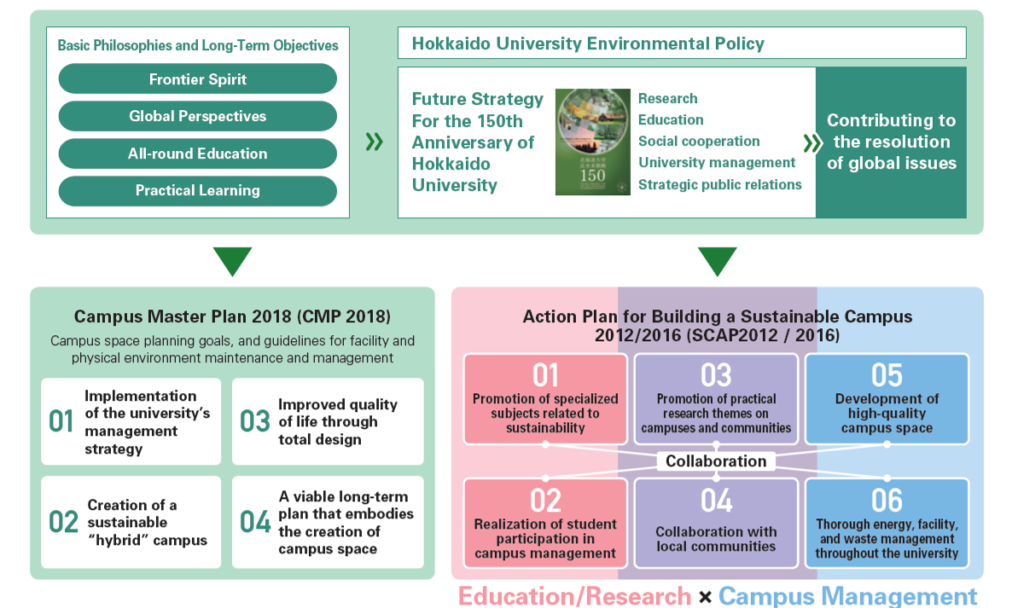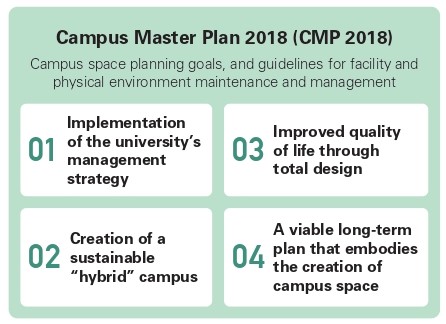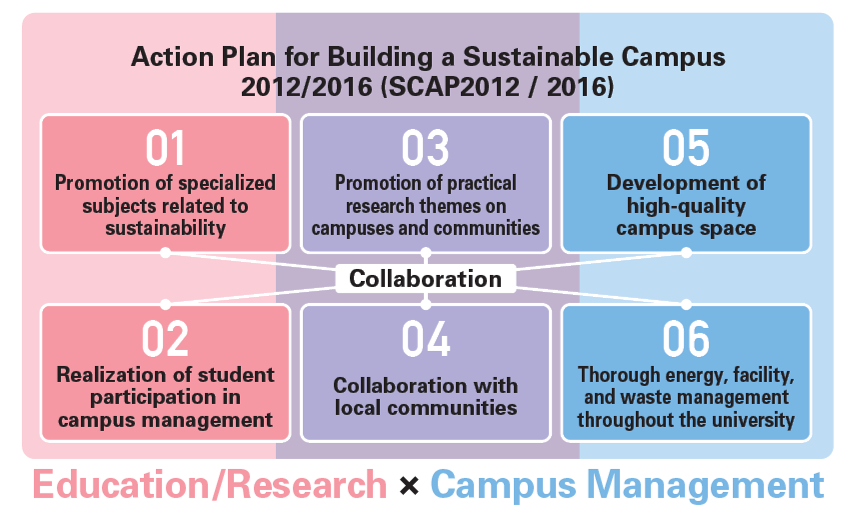About Us
Main Measure for Building a Sustainable Campus
Hokkaido University Environmental Policy
Hokkaido University has four basic philosophies and long-term objectives: “Frontier Spirit,” “Global Perspectives,” “All-round Education,” and “Practical Learning.”
Based on these, in 2014, the University formulated the “Future Strategy for the 150th Anniversary of Hokkaido University” as its reform strategy for the important milestone of the 150th anniversary of its founding in 2026.
Based on the above four basic philosophies, long-term objectives, and strategies, the University contributes to “the resolution of global issues” from “SDGs initiatives” through its environmental policy and various measures aimed at promoting sustainability, and will build a Green, Smart, and Sustainable Campus (a campus that is in harmony with education, research, social cooperation, and the natural environment).

Basic Philosophies
- Frontier Spirit
- Global Perspectives
- All-round Education
- Practical Learning
Future Strategy for the 150th Anniversary of Hokkaido University
Formulated in March 2014
Hokkaido University will have 150th anniversary in 2026. The following goals have been set to promote university reform toward “Hokkaido University contributing to the resolution of global issues.”
- Hokkaido University will promote world-class research to resolve a variety of issues to sustain future generations.
- Hokkaido University will produce graduates who will play a leading role in contributing to the development of a global society. As specialists in their fields, they will possess sound judgment and deep insight, along with the ability to understand and communicate with those of different cultures.
- Hokkaido University will continue to transmit knowledge and promote social advancement through outside collaborations, providing assistance to regions and communities in Japan and overseas by addressing and resolving the issues that concern them.
- Under the leadership of the president, Hokkaido University will carry out reforms of our organizational, personnel, and budget systems, establish an infrastructure that enables members to carry out their tasks with a sense of pride and fulfillment, and implement administrative policies with a focus on sustainable development.
- Hokkaido University will establish a global presence by actively publicizing the fruits of its education and research through strategic marketing.
Hokkaido University Environmental Policy
Formulated on September 5, 2005
Basic philosophy
Hokkaido University will play a central role in Japan’s academic research and human resource development for researchers, and as a national university that supports the foundation of Japan’s knowledge in the 21st century, it will protect the environment from the global level to the regional level through all activities and strive to build a sustainable society.
Basic policy
To concretely realize the basic philosophy, Hokkaido University will establish an environmental management implementation system and will set and implement environmental goals on the following with the participation of all persons on campus, including faculty, staff, and students. The university will also make the goals known to everyone on campus, including faculty, staff, and students, and will disclose the goals to the general public to establish continuous environment-conscious activities.
- Consideration for the global and local environments through education and research
- Contributions to society through the dissemination of environmental information
- Reduction of environmental load associated with university management
Campus Master Plan (CMP 2018)
The campus is the foundation for education and cutting-edge research, as well as a place for students, faculty, and staff to live as a university. To maintain and utilize the attractive campus, which has numerous historical buildings, buried cultural properties, and a rich ecological environment with diverse vegetation and rare species in the water system, Hokkaido University prepared the “Campus Master Plan,” a general framework for campus space utilization, ahead of other national and public universities, and has been promoting it for 20 years.
The “Hokkaido University Campus Master Plan 2018” inherits the planning framework of the “Campus Master Plan 96” and “Campus Master Plan 2006.The “Hokkaido University Campus Master Plan 2018” has four major features: “Implementation of the university’s management strategy,” “Creation of a sustainable “hybrid” campus,” “Improved quality of life through total design,” and “A viable long-term plan that embodies the creation of campus space.” It emphasizes the comprehensiveness and effectiveness of the plan.
In March 2020, the “Hokkaido University Campus Master Plan for the Hakodate Campus” was also formulated as a specific plan for the Hakodate campus based on the individual realities of the Hakodate campus, while following the basic objectives, concepts, etc. presented in the “Campus Master Plan 2018.”
This is the first master plan for the Hakodate campus.
This Campus Master Plan includes plans that will form the framework for the future Hakodate Campus, such as the drafting of a “Framework Plan for Space Creation” that outlines the long-term future of the campus, and the establishment of a management structure for the Hakodate Campus, including the creation of a new task force.
Individual action plans will be carefully considered and formulated in consultation with relevant parties inside and outside the University.

Action Plan for Building a Sustainable Campus 2012/2016 (SCAP2012 / 2016)
The “Action Plan for Building a Sustainable Campus 2012” was formulated as a concrete action plan to realize the second mid-term goal of promoting advanced campus development and environmentally conscious campus development to support world-class education and research.
The “Action Plan 2016” was developed as a revised version of the “Action Plan 2012” after evaluating the implementation status of the “Action Plan 2012” with the Sustainable Campus Evaluation System (ASSC). The Action Plan 2016 is a university-wide initiative to be implemented by all relevant departments and divisions.
The Action Plan 2016 sets six new objectives under the University’s environmental policy. These objectives are unique in that they combine the aspects of building a high-quality campus with a low environmental impact with the promotion of education and research related to sustainability.
The campus is the stage that underpins the university’s education and research, and must function in harmony with the “Future Strategy for the 150th Anniversary of Hokkaido University.”” that Hokkaido university has set forth. To this aim, it is important not only to further advance sustainability education and research, but also to actively engage in campus management through mutual cooperation among students, faculty, and staff in each department, as well as administrative staff responsible for campus planning and maintenance.

